- Home
- Vicki Delany
Silent Night, Deadly Night Page 4
Silent Night, Deadly Night Read online
Page 4
“Most amusing. I’ll make an extra couple of turkey pies, and I might throw in some mince tarts as well. Not quite Thanksgiving, but we’re baking them already.”
“Yummy,” I said. “Save one for me.” Vicky’s mince tarts were the best.
* * *
* * *
Sunday morning I opened the shop at the regular time of twelve o’clock. The previous night, Alan and I had gone to A Touch of Holly, the restaurant across the street from Mrs. Claus’s, for dinner. We’d had a nice meal and then gone back to my place to get Mattie before enjoying a long walk on the trails lining the lakefront. Winter was coming, and the night was cold, but no snow was in the forecast yet. The skies had been clear, and as we got away from the lamps of town, the stars above appeared in a blaze of light. We’d held hands and walked in silence, watching Mattie checking out the news of the neighborhood as left under bushes and around trees.
It had all been perfect, and I reminded myself that solid, dependable, kind Alan was not Max, my cheating rat of an ex-and-late fiancé.
The first people through the doors today were a middle-aged couple. The woman’s mouth was a slash of red lipstick, and her smile was wide and her eyes warm and friendly. She wore a camel trench coat with a thick belt and a double row of dark buttons stamped with the Burberry brand. The man with her reminded me of businessmen I’d sometimes met with in Manhattan, with his thick silver hair, close shave, and manicured hands. His coat was black wool, and I guessed that it had cost in the two-thousand-dollar range.
“You were so right, honey,” she said. “This is darling!”
“Welcome.” I gave them a smile. “Let me know if I can help you with anything.”
“I love your tree,” she said. “Is it real?”
“It is, and it’s replaced the first of every month all year round by a local tree farmer. Most of the other greenery in this shop isn’t real though. If you’re looking for flowers or other live decorations, the florist farther west along Jingle Bell Lane carries that sort of thing, and it’s all marvelous and fresh.”
She clapped her hands together. “I absolutely love those porcelain dolls. I collect Santa dolls.”
“Then you’ve come to the right place,” I said, smiling at her enthusiasm.
She wandered through the store, exclaiming over everything she saw. The man held out his hand. “Wayne Fitzroy. You won’t stay in business long if you send your customers elsewhere.”
I shook the offered hand. “Pleased to meet you, Wayne. I’m Merry Wilkinson. In Rudolph everyone helps everyone else. Better for us, and better for our customers, meaning people come back.”
He flashed a mouthful of white teeth. “That’s what I like to hear. Norma and I were heading home after church and she had a sudden urge to pop in.”
“Home,” I said. “Do you live nearby? I’m afraid I don’t . . .”
“We’re new to town, only been here a couple of months. We left the big city and the rat race searching for the simple life. I think we’ve found it here, don’t you agree, honey?”
“Oh yes,” she said.
They might have left the rat race, but judging by their clothes, I didn’t think the simple life would suit these two all that well.
“I want to get actively involved in the town,” Wayne said. “Give something back to the community that’s made us so welcome. You’re Noel Wilkinson’s daughter, or so I’ve been told.”
“You know my father?”
“I haven’t had the pleasure yet, but you can’t go far in Rudolph without hearing the Wilkinson name.”
“He’s in Florida at the moment, getting a fishing trip in before the parade and the start of the Christmas season.”
“Ah, yes. Town Santa.”
“That’s right.” My dad, Noel, played Santa at all the official town festivities.
Norma Fitzroy put three porcelain dolls on the sales counter. Santa, Mrs. Claus, and a female elf, all hand-painted and dressed in hand-sewn clothes and accessories. “I’ll take these, please,” she said.
Wayne pulled out his wallet with a flourish, and I went behind the counter to ring up the purchases and wrap them.
“It was nice meeting you, Merry.” Wayne picked up the paper shopping bags.
“Bye.” Norma wiggled her fingers as they left.
She seemed genuinely nice, I thought. As for him, he tried too hard. I’d seen enough of that phony charm and pretend friendliness in Manhattan, and I recognized it instantly. But if they were interested in the welfare of Rudolph, they should fit in nicely. Our small town would soon rub away at his big-city edges.
My next customer was Karla, one of Mom’s friends.
“Good afternoon.” I peeked around her, looking for the others. No one followed her in, so it seemed as though she’d come alone.
“I’m glad I found you here,” she said. “I’d like to get a hostess gift for Aline.”
“That’s nice of you. I’m sure we can find something suitable. My mom’s fond of Crystal Wong’s jewelry.”
“Nothing too, uh, expensive,” Karla said. “Just a token.”
I led the way to the jewelry display. “Are you having a nice visit?”
“I guess.”
Not exactly a ringing endorsement. She picked up a necklace, checked the price tag, and put it back down.
“You’re from Minnesota,” I said. “I’ve never been to Minnesota.”
“God’s county,” she said firmly.
“Are you from the East originally? You went to college with Mom.”
She laughed without humor. “What can I say? I followed my dream of being a dancer. The dream didn’t last, but I was stuck at Steinhardt.” She wandered over to check out the holiday linens display.
“I wouldn’t say ‘stuck.’” For some reason I felt I had to defend my mom’s alma mater. “It’s a fabulous school. My mother loved her time there.”
“She might have,” Karla said, “but I hated every minute of it.”
I took another look at her. Her face was pale and plump, but bitterness was carved into lines around her mouth and eyes. She picked up a china cup, painted with sprigs of holly and red berries. I edged away, thinking I’d leave her to examine my goods in peace.
She put the cup down and let out a puff of air. “I shouldn’t have come. Here I am again. Stuck with that bunch, exactly as I was all those years ago. I never fit in there, you know. Not with them and their dreams of Broadway or Hollywood. Not in my class, either, with all those beautiful willowy girls. Believe it or not, I was thin once. But I was never tall.”
She spoke more to herself than to me, but I found myself asking, “Why did you come for this reunion weekend then?”
“Because Aline invited me, and my daughter said I should go.” She shrugged. “And then Constance wrote and told me she was coming, and so I thought I might as well come, too. I was never one of their crowd of artistic divas. Even Barbara, who ended up being a lawyer, could put on the theatrics when she wanted. Maybe that’s why she is a lawyer. The rest of them got an apartment together after first year, but I stayed in the dorm. All that just us girls stuff and constantly popping in and out of each other’s rooms was always too much for me. I only went into the dramatic arts because my high school teacher encouraged me. She was a fool. Let’s just say that being the star of dance class in Northfield, Minnesota, doesn’t cut it in New York City.”
Mentally, I rolled my eyes. I’d known Karla for all of half an hour and so far everything she’d told me about herself was that all she did was what other people had told her to do. “Still,” I said, “it’s nice to keep up with old friends, isn’t it? I’m sure you’re having fun now that you’re here.”
“Fun, yeah. Great fun.” Her tone was sharp, her voice bitter. So sharp and bitter, Jackie looked up from where she was arranging a display of wooden toy trains
. “Let’s see what we’ve been doing.” Karla counted off on her fingers. “Barbara wants to have us all out of bed with the sun. An invigorating hike before breakfast. If I say I don’t want to go, she’ll eye my hips and suggest that I could use a bit of exercise, and Genevieve will laugh that evil laugh of hers. Constance will drink nonstop and drop names left, right, and center, every chance she gets, making sure we all know that she moves among the rich and famous in L.A. And Ruth, poor Ruth, with that layabout husband of hers and the four kids and not a penny to her name. All she cares about anymore are her silly mystery novels.”
I said nothing. There was nothing I could say, and it didn’t matter. All Karla wanted was the chance to pour out her misery.
“At least when Ruth drones on about the full plot of the latest book she’s read, she’s not complaining about the place where she works. She’s a clerk in a grocery store, can you imagine anything more boring?” I couldn’t help but see Jackie, standing behind Karla’s back, spinning her finger in the air at the side of her head. I could imagine plenty of more boring things (such as listening to Karla), but I didn’t say so. “And then there’s Constance. Born to money, silver spoon in her mouth. And don’t you dare forget it. The only one of them I can stand, ever could stand, was your mother. Aline, genuinely talented and nice.”
I nodded in agreement. My mom and I had our differences—didn’t all mothers and daughters?—but I loved her a great deal.
“Your father’s name is Noel, right?”
“Yes.”
“Nothing came of her and Paul, then?”
“I don’t know any Paul, so I guess not.”
“‘Paul the Doll,’ we called him. We all had crushes on him, but Aline was over the top about it. I always thought he was just playing with her. Playing with all of us. His adoring little harem. He did okay, I heard. Landed some good parts on Broadway. I guess we all play around when we’re first in college, don’t we? It’s part of being young and innocent.”
“Mom loves the whimsical cocktail napkins I have,” I said, desperate to bring an end to this conversation. I pointed to the display rack.
Karla didn’t get the hint. “Not that innocence lasts long. Constance was the only one of us who snagged a man at college. She married Frank Westerton, who was as much a flirt as Paul the Doll. He was a real slimeball, that Frank.” Karla’s face settled into angry lines. “But Constance couldn’t see it. As for me, I went back to Minnesota, which I should never have left, and found a great man who’d been there all along. We had our thirty-fifth wedding anniversary last month.”
“Congratulations,” I said, carefully avoiding looking at Jackie, who was now imitating a constantly moving mouth with the fingers of her right hand.
Karla droned on. “I was telling the women at dinner last night how well our company’s doing. Unlike Constance, who inherited everything, Eric and I built our construction business completely from scratch. We didn’t need anyone’s help.”
“Most admirable. If not the napkins, how about—”
“Funny to see how people’s lives turn out. I would have said Ruth was the one most likely to succeed. She was an actor, but her eventual ambition was to direct big-budget movies. Instead, she ended up back in her two-bit town with a drunk of a husband. She’s a clerk in a store.”
“So you said. Perhaps she enjoys it.”
Karla’s expression indicated what she thought of that idea. “What a waste of a life. My husband, Eric, and I own the biggest construction firm in our part of the state. I work for us as the head bookkeeper and office manager. I dropped out of my junior year in college, I couldn’t see any point in staying, and went to business school instead.”
Karla’s bitterness filled my shop. Waste of a life, indeed. Karla might have been talking about the others, but I got the feeling she was thinking about herself. I edged to the napkin display and selected a set showing a field of pumpkins at sunset. “What about these for your dinner tonight? Sort of an early Thanksgiving theme.”
Karla shrugged. “I don’t think so. Maybe I’ll just get a card or something. Nothing I can afford will be able to match what Constance is probably going to buy your mother.”
“The napkins are five ninety-nine. I’ll let you have them at cost. It’s the thought that counts.”
“So they say. I’ve never believed it. We’ll see you at dinner tonight, your mother said.”
“Yes. I’m looking forward to it.”
“I’m not. Potlucks are such a risk for me, with my peanut allergy.”
“Surely you reminded everyone of that.”
“I did, several times, but some people can be self-centered and thoughtless, can’t they? Luckily none of Eric and my children inherited the allergy. I checked all the shopping bags when we got back from the market yesterday, just to be sure. Barbara’s making some sort of bean thing. Sounds absolutely dreadful.” The tone of Karla’s voice never varied. A constant drone of complaints.
“You don’t have to eat it.”
“No, I don’t,” she said. “I might come back later and get something for my grandchildren. No, that won’t work. I’d have to pack it, and I only brought carry-on luggage on the plane.”
She left the shop. The bells over the door tinkled cheerfully. They were the only cheerful thing in my shop. Karla’s bitterness had seeped into the very walls. I started to give my head a shake to get rid of the feeling; instead, I let out a yelp and leapt into the air. Jackie had dropped the train engine. All the cars in the train, from engine to caboose, were linked together by wooden hooks and hoops, and they fell to the floor in a seemingly endless crashing of train cars.
“Sorry,” Jackie said. “I was so busy wondering what she’d find to complain about next, I forgot I was holding this.”
Slowly, my heart rate returned to normal. At least the train wasn’t made of glass like many of our ornaments.
Chapter 5
The day was busy with people getting an early start on their holiday shopping or stocking up for Thanksgiving guests, and I put Mom and her friends out of my mind.
At six o’clock, Jackie bade me a good night. I locked the front door behind her, switched off most of the lights, and went into the back for Mattie and my potluck ingredients. I greeted Mattie, told him he’d been a good boy today, and let us out the back into the alley.
The bakery closes before my shop, so I’d arranged to meet Vicky at Mom’s. Mattie was always welcome there, as long as he behaved himself, which he did. Most of the time. My mom had some nice things, collected when she’d traveled the world singing opera, and she would not be happy if anything got broken. My parents live not far from Jingle Bell Lane, so we would walk to their house. We went slowly, as Mattie took his time and sniffed at every lamppost and raised his back leg at many of them. The night was cool, but the temperatures were above freezing, and the walk was comfortable.
My parents still live in the house in which my three siblings and I grew up: a grand old redbrick Victorian with multiple entrances and a steep green roof, built in the mid-nineteenth century when Rudolph was a prosperous Lake Ontario shipping port. It had three stories, a big bay front window, gingerbread trim, dormer windows, and a wide porch stretching across the front of the house and curling around one side. My dad believes in celebrating Christmas all year round, but in one thing only my mom put her foot firmly down at the beginning of their marriage: the decorations, including an impressive display of outdoor lights, don’t go up until the Sunday after Thanksgiving. In this they were in the minority in Rudolph. Many if not most of the houses on their street were lit by a variety of outdoor lights, ranging from tasteful white trim to full-on flashing displays of color bright enough to read by.
Mom’s perennial gardens were neatly tucked away for the winter. The stately maples and oaks, many of which predated the house, stood bare and stark, and the more delicate of the bushes were wrapped in
burlap. The flower beds had been dug up and overturned, a few tall swaying golden grasses left to provide spots of interest.
As I turned into their street, I saw a small dark compact car backing out of my parents’ driveway. It reached the road, turned, and accelerated, heading away from me. It rounded the next corner and was gone. One of Mom’s or Dad’s friends, I assumed, making an impromptu visit and finding out that Dad wasn’t home and Mom was entertaining.
I walked up the driveway to the back of the house and let myself in through the kitchen door. “It’s Merry!” I called. The soft murmur of voices came from the front rooms. The oven was on, and the kitchen was warm and full of the smell of roasting meat. Mattie’s nose moved as he took in all the marvelous scents. I took a deep breath myself.
The house might be a nineteenth-century original, but the kitchen is thoroughly modern: glass backsplash, ceramic tiled floor, granite countertops, a large wooden island with chrome and leather barstools pulled up to it. I put my salad bowl and ingredients on the island next to an assortment of covered dishes, serving bowls, and bakery boxes, and took Mattie’s leash off. “Now, you be good,” I said.
He grinned at me before running around the kitchen, nose to the ground. Because of his size—he was tall enough to rest his chin on a table without stretching—teaching him to leave people food alone had been an important part of his training.
I carried the bottle of wine I’d brought and followed the sound of voices, Mattie trotting at my heels. The walnut table that could comfortably seat twelve, which had been in my Dad’s family for almost a hundred years, had been set for eight with Mom’s best sterling silver cutlery, gold-trimmed china, crystal water and wineglasses, and Thanksgiving-themed place mats and matching cloth napkins. Glass candle holders containing tall white pillars, still unlit, were laid in a long row down the length of the table.
The dining area opens directly onto the living room, and both rooms are decorated with things Mom collected in her travels. Venetian glass art, Wedgwood bowls, Chinese vases, Tanzanian sculptures, Japanese pen-and-ink sketches, English watercolors. The wood fireplace burned cheerfully, dispelling the touch of autumn chill, and more candles had been set on almost every available surface, giving the room a soft warm glow. Leonard Cohen crooned softly from the Bose speakers. I put my wine bottle on the side table that served as a bar.

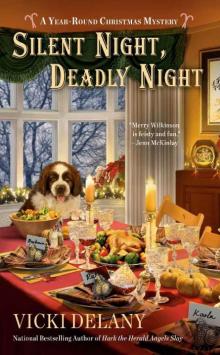 Silent Night, Deadly Night
Silent Night, Deadly Night Coral Reef Views
Coral Reef Views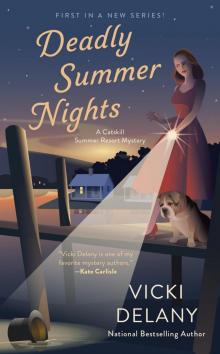 Deadly Summer Nights
Deadly Summer Nights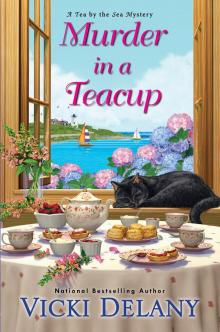 Murder in a Teacup
Murder in a Teacup Whiteout
Whiteout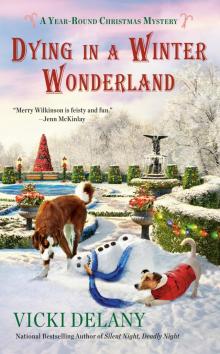 Dying in a Winter Wonderland
Dying in a Winter Wonderland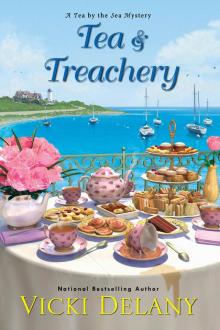 Tea & Treachery
Tea & Treachery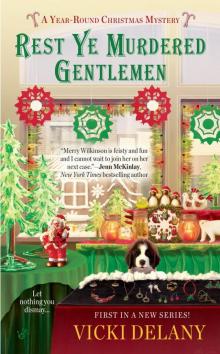 Rest Ye Murdered Gentlemen
Rest Ye Murdered Gentlemen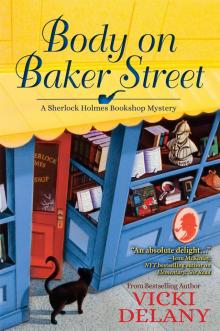 Body on Baker Street: A Sherlock Holmes Bookshop Mystery
Body on Baker Street: A Sherlock Holmes Bookshop Mystery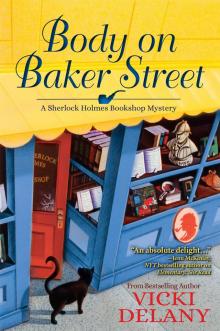 Body on Baker Street
Body on Baker Street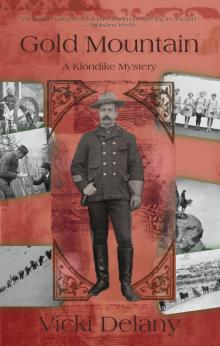 Gold Mountain
Gold Mountain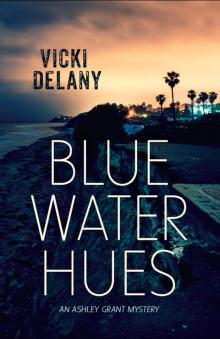 Blue Water Hues
Blue Water Hues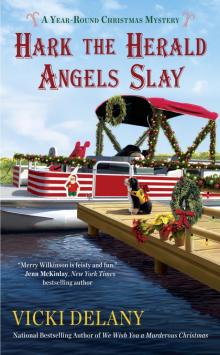 Hark the Herald Angels Slay
Hark the Herald Angels Slay Murder at Lost Dog Lake
Murder at Lost Dog Lake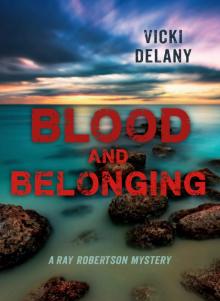 Blood and Belonging
Blood and Belonging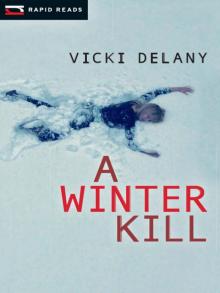 A Winter Kill
A Winter Kill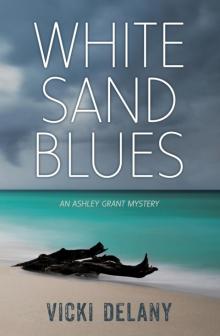 White Sand Blues
White Sand Blues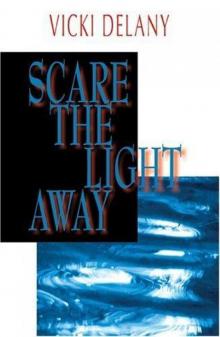 Scare the Light Away
Scare the Light Away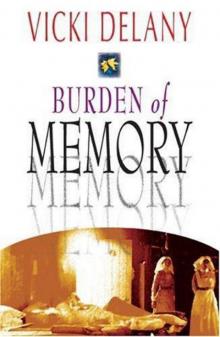 Burden of Memory
Burden of Memory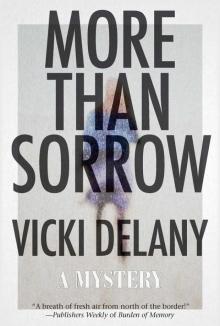 More Than Sorrow
More Than Sorrow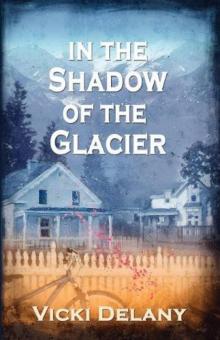 In the Shadow of the Glacier
In the Shadow of the Glacier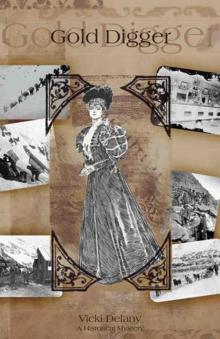 Gold Digger: A Klondike Mystery
Gold Digger: A Klondike Mystery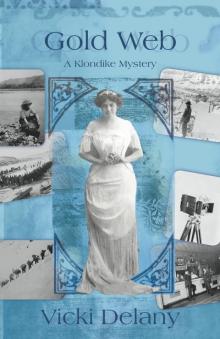 Gold Web
Gold Web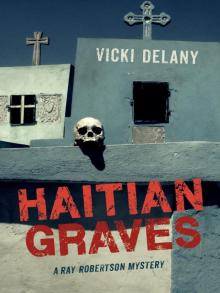 Haitian Graves
Haitian Graves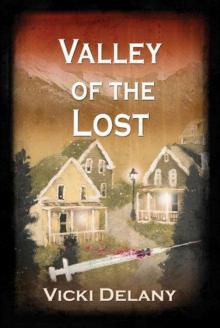 Valley of the Lost
Valley of the Lost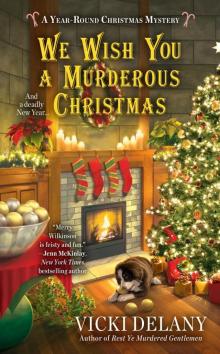 We Wish You a Murderous Christmas
We Wish You a Murderous Christmas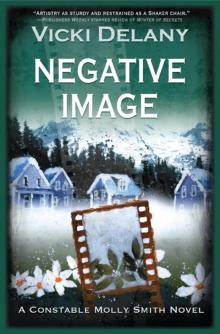 Negative Image
Negative Image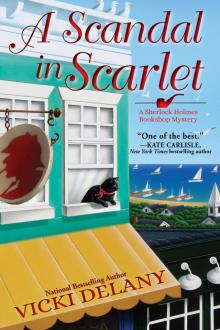 A Scandal in Scarlet
A Scandal in Scarlet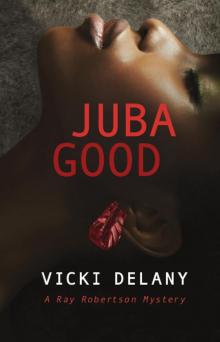 Juba Good
Juba Good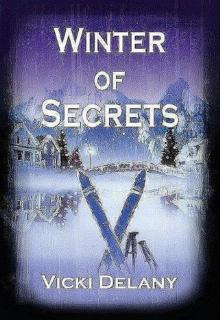 Winter of Secrets
Winter of Secrets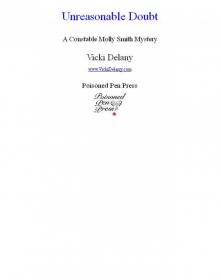 Unreasonable Doubt
Unreasonable Doubt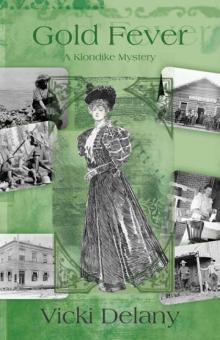 Gold Fever
Gold Fever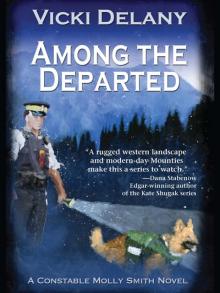 Among the Departed
Among the Departed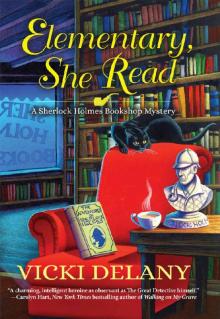 Elementary, She Read: A Sherlock Holmes Bookshop Mystery
Elementary, She Read: A Sherlock Holmes Bookshop Mystery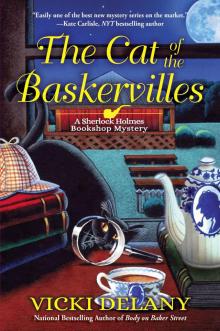 The Cat of the Baskervilles
The Cat of the Baskervilles